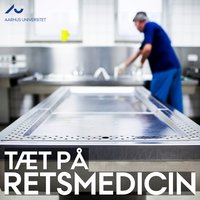Fans of true crime should pay attention
Podcasts from examination rooms and autopsy rooms at the Department of Forensic Medicine provide an insight into a field of study that very few people have access to.

“I’m wiping off from penis to scrotum, and here it’s okay for him to stand with his back to the police if he feels uncomfortable.”
Medical specialist in forensic medicine Lise Frost describes in detail how she systematically examines a suspect in a rape case. The scene is the examination room at the Department of Forensic Medicine. A place where the only people normally allowed in are those who are being examined, police officers and forensic pathologists.
But now anyone with an interest in this world is invited behind the closed doors. In an episode of a new series of podcasts from the Department of Forensic Medicine, Lise Frost describes a personal examination from the moment the person enters the room in a white crime scene overall with their hands in special plastic bags, until the DNA traces are secured in sealed bags and the police have left with the suspect again.
Not just autopsies
The podcast on the personal examination is one in a series from the Department of Forensic Medicine which let the true crime audience in on what actually takes place at the department. Not least in order to challenge the commonplace perception that forensic pathologists spend the whole day cutting up corpses, as Lise Frost puts it.
"I often find there’s a biased idea about what I do as a forensic pathologist. But more than half of my time here is actually spent on examining living people," says Lise Frost, who believes that radio is the ideal media for describing her field.
"Forensic medicine is a sensitive field, and you’ve got to take lots of ethical considerations into account. That's why we're so particular about letting in the media and journalists. But this is also one of the reasons why our field is often taboo and seems so dramatic. However, by using podcasts, we can calmly explain how something like a personal examination is carried out. This gives medical students thinking about specialising in forensic medicine useful information, but maybe it’ll also be helpful for a relative of a victim or a suspect to hear about what actually takes place in an examination room," says Lise Frost.
In addition to the episode with Lise Frost, there are podcasts on CT scans of corpses, the work of forensic dentists on identification, and the methods used by forensic chemists to detect substances which are hazardous for driving in blood samples. More podcasts on the work of forensic medicine are underway.
The podcast series from forensic medicine can be downloaded from forensic.au.dk or via a podcast app by searching for Tæt på retsmedicin (available only in Danish). All podcasts are produced by journalist Jakob Kehlet.
Link to forensic.au.dk: https://forensic.au.dk/forskning/publikationer/podcastserien-taet-paa-retsmedicin/
